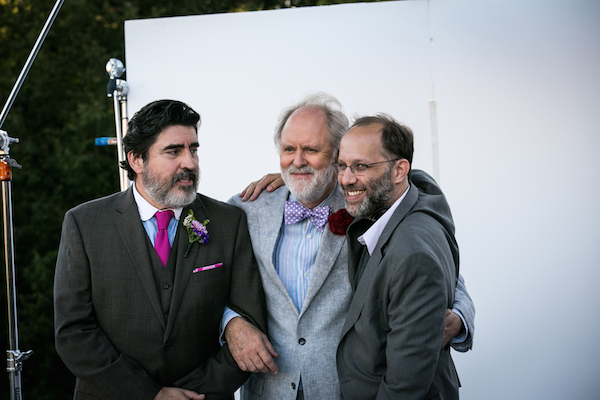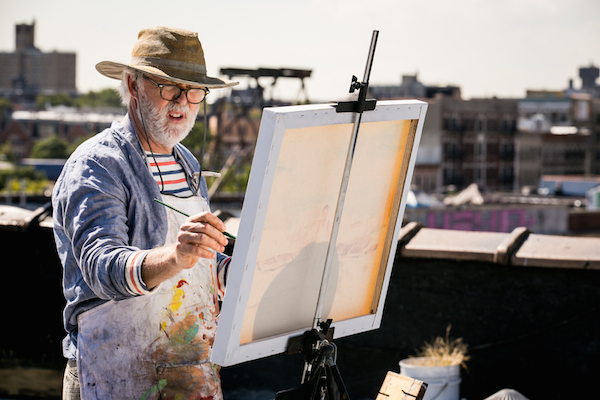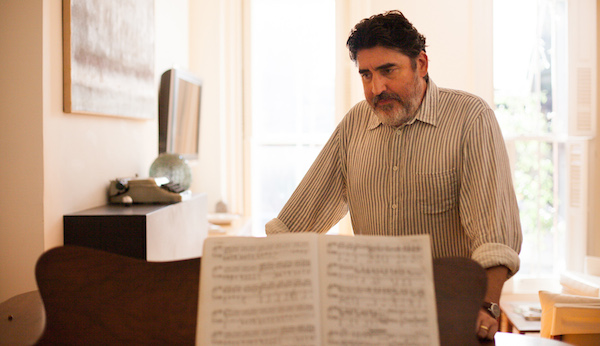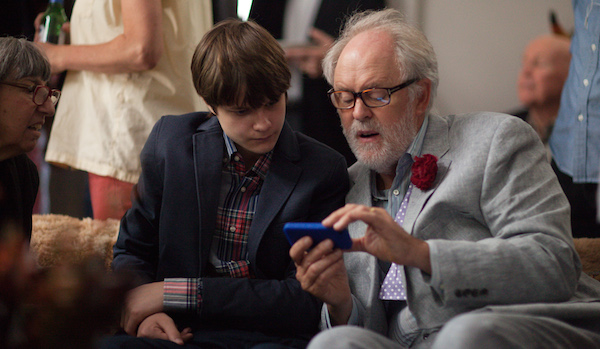Love Is Strange is a peculiar film that subverts our expectations. I walked into the Holiday Village Cinema theatre at Sundance expecting to see a romantic comedy starring John Lithgow and Alfred Molina, undisputedly two of our most gifted performers, as a pair of newlyweds comically struggling to make it work as freshly minted husband and husband. In the traditional romantic comedy, the wedding comes as a celebration at the end of the narrative. It’s the reward for the lovers having successfully surmounted all matter of obstacles, whereas in Love Is Strange, the wedding at the top of the film indirectly precipitates the end of the time-tested affair. Rather than providing a foundation of stability for the couple, their wedding undermines their economic security. George is terminated from his teaching job at a Catholic school. As a result, the couple is forced to sell their apartment, shack up with friends and relatives, and endure temporary separation. The newlyweds spend more time apart than together, in this bittersweet dramedy with a melancholy heart.
George (Alfred Molina) holes up with friends, Ted (Cheyenne Jackson) and Roberto (Manny Perez), a pair of gay cops who like to entertain late into the night, while Ben (John Lithgow) ends up sharing the bunk bed of his adolescent grand nephew, Joey (Charlie Tahan). Joey comes to resent his grand uncle’s invasion of his privacy and tensions mount, as Joey’s father Elliot (Darren Burrows) and mother Kate (Marisa Tomei) try to navigate the imposition with grace. Palpable is the underlying anxiety surrounding Joey’s romantic awakenings and how Ben’s preferences may or may not influence Joey’s self-awareness. With the last shot in the film, Sachs seems to be offering the most conservative of assurances to his audience, that same-sex marriage is not an institution that will threaten traditional values. If anything, it should bolster and fortify the institution of marriage.
Needless to say, each and every time that Lithgow and Molina grace the screen in shared scenes, the film springs to life. Their performances are a thing of beauty and a joy to behold. It is inspired casting. I only wish that the premise of the film had enabled these two actors more time to light up the screen together.
Love Is Strange, which premiered at Sundance, has received glowing critical reviews. I was delighted to speak with the extremely warm and personable director Ira Sachs at the Fairmont Hotel in San Francisco about his most intimate film to date, Love Is Strange.

Photo by Clay Enos, Courtesy of Sony Pictures Classics.
Sophia Stein: You and your partner, Boris Torres, were married in January of 2012. Was marriage the realization of a dream deferred, as it was for the protagonists in your film, Ben and George?
Ira Sachs: No — we were married a week before our kids were born. We call it a gay shotgun wedding. [Big laugh.] The law had only changed six months previously. It’s been more meaningful than I’d expected, to be able to call a man my husband. It has drawn attention to the fact that I could not do so up until then. Recognizing an inequality that you were not aware of is really striking. It makes you realize the cloud that you have been living under. Both the marriage in the film and my own marriage are not just about the laws, they are about the union of two people. Love Is Strange is primarily about this long term relationship that is so loving and tender between two individuals.
Sophia: In conceiving the screenplay, you have said that you wanted to imagine what your own marriage might look like in the years down the road. What did you discover?
Ira: In my own marriage, I hope for the sense of humor that Ben and George have with each other. I hope for the acceptance that they have. In some ways, their relationship seems timeless. It doesn’t actually seem forty years old, and yet you believe the history between them. That immediacy between them is something that I strive for in my own relationship. There is a kind of honesty between them. It seems significant to me that Love Is Strange is an optimistic film about the possibility of love between two men — which is something that I personally could never have made ten years ago.
Sophia: The film begins with this wedding, and we do feel so optimistic about the happily-ever-after of these partners for life. But then the proverbial “shit hits the fan,” as it were, and as an indirect result of their marriage, the two men are separated for the first time.
Ira: Well, that’s called drama.
Sophia: At one point, George asks Ben, “Do you ever blame me for all of this?” I feel that the film very directly confronts fears about the institution of marriage for single-sex couples, both from the perspective of the new spouses and from the perspective of the society at large.
Ira: I think that the film speaks to the vulnerability of these two men, both economically and in terms of their ages. That’s where the title, Love Is Strange, comes from. “Strange” is another word for unique. For each of us, love – whether that be the love between a parent and child, between partners, neighbors, whomever – that love is unique. I think that film has the ability to beautifully capture that intimacy. You see George using the term “husband” for the first time, and that was something that was very personal to me. I knew how strange it felt.
Sophia: I love all of the scenes between John Lithgow and Alfred Molina. What went into the writing of that final scene in the bar and when they are walking to the subway?
Ira: I wanted to make a very romantic film. I wanted to use humor in doing so. These are men who take themselves seriously but not too seriously. I think that’s so important. It’s an attitude, for me, that has been hard won.
What I couldn’t have anticipated was how much these two actors would grow to love each other in the course of making the movie. John and Alfred really developed what I am certain will be a long and deep friendship — that was also romantic, in its own way. They had a kind of banter … I wish they were here. These guys are just like their characters. They’re working. John has to play King Lear tonight, so he’s busy. It’s been really interesting to get to know them even better over the past year since we finished up shooting. I think the film is very much about what we learn from one another. I learned about the passion that both John and Alfred have for what they do and about their creative aspirations as individuals. John is really in the peak of his creative life at seventy years old, and that is something that all of us can strive [to emulate].

Photo by Jeong Park, Courtesy of Sony Pictures Classics.
Sophia: A number of years ago, I had the pleasure to work behind the scenes on this audiobook that John Lithgow edited, produced, and narrated called, The Poet’s Corner. It is this wonderful anthology of great poems read by extraordinary actors.
Ira: He’s a worker. He’s involved with so many things at once. I love that. Ben and George are both confident and yet modest. I think those two qualities are very beautiful together. Ben and George make a couple that people want to be around – which is one of the reasons that I think people respond to the film.
Sophia: Just knowing that John Lithgow and Alfred Molina were going to be acting in the film together, I wanted to see it instantaneously. How did you arrive at casting these two marvelous actors?
Ira: I cast Alfred first, as soon after we finished the script. I knew Alfred from his movies, specifically Prick Up Your Ears and Boogie Nights. These are two performances have stuck in my mind for their authenticity and their ease. We first met on SKYPE. Alfred was in L.A., and I was in New York. We just liked each other. He liked the script, so he became a part of it over the year that it took us to raise the financing. John came in towards the end. John and Alfred have known each other for twenty years; they have a collegial history. When I went to Alfred’s house, on his mantle he had a photograph from ten years earlier of John Lithgow and himself backstage at the Tonys. They were not close friends, but they were both interested in becoming better acquainted. It turns out that they have very similar lives: they both live in Los Angeles, both have been in long marriages, and both are “thespians.”
Sophia: You cast two men who are in heterosexual marriages. Did you ever consider casting gay actors in these roles?
Ira: Certainly there were openly gay actors on our list of actors to consider, but these two guys just seemed like the perfect pair. Sexuality is a part of their identity, but it doesn’t define them. “Gay” is one of many adjectives.
Sophia: Love Is Strange was inspired by an article you read about a man who lost his teaching job at a Catholic prep school in response to his public nuptials. When I told my husband about the premise, he commented, “That is implausible. He couldn’t lose his job like that. He could sue the school for discrimination.” Do you know about the civil rights implications of such termination?
Ira: Tell your husband to Google “gay marriage firing U.S.,” and he will see a long list of cases that have occurred since we wrote the screenplay. There are more and more. What’s interesting to me about Ben and George is that they are not fighters. That’s how they are different than me. They are modest, working people. They have a great sense of who they are, but they are not taking to the streets. That’s not who they are.

Photo by Jeong Park, Courtesy of Sony Pictures Classics.
Sophia: In a pivotal scene, George is teaching a piano lesson, and he is unflinchingly truthful with his young piano student in constructively critiquing her playing. Simultaneously, he is preoccupied composing a letter in his mind that he will send to the community from which he has been forced out. The scene is beautifully written, performed, and edited. Can you talk about what went into the making of that scene?
Ira: It came together in all of the elements that I care about in cinema. There is the Chopin piano music and the beauty of the image. The ability of film to capture the ineffable quality of youth is poignant to me. Alfred Molina delivers a very interior and nuanced performance in that moment.
Sophia: The film opens with this very prosaic sequence: these guys are getting up, getting dressed, rushing out the door – but it is all underscored by this lush, romantic Chopin piano piece. The piano music so perfectly matches the feeling their relationship inspires. Every time I hear that Chopin in the film, I feel like they were meant to be together. That everything is right in their world, and that it is only right when they are together. Outside of their relationship, the score of your film is relatively spare. What was your inspiration to use the Chopin, as you did?
Ira: We were very influenced by Woody Allen’s Manhattan and the use of Gershwin in that film. Mauricio [Zacharias] and I had written the scene for this little eight year old piano prodigy, Dovie Currin, to play a Chopin prelude. Then I started to listen more generally to Chopin, and I realized that it had everything I was looking for. To try to find someone to try to create piano music as diverse and beautiful as that would have been a challenge. I thought that this music spoke to these men and their artistic interests.
I don’t know if you feel this way, but I think that there is a generation that was deeper than ours. I see them passing. Their relationship to history, music, art, knowledge, and education is challenging to me in some ways. I feel less than them. I think that Marisa Tomei as Kate plays out this distinction in the film. She is questioning what can she expect for herself and for her own life. Watching Ben is driving her crazy, and yet, she recognizes that there is something very noble about him.
In a lot of ways, I feel like I’m in Kate’s position. I am definitely middle-aged. (Hopefully, in the middle of my life.) There are a lot of questions that start to arise at that point. This film is very much about these different seasons and different perspectives — of an older couple, a middle-aged couple, and, ultimately, of this child. You could say the film is a coming of age film.

Photo by Jeong Park, Courtesy of Sony Pictures Classics.
Sophia: Opponents of gay marriage always argue their concerns that same sex marriage might harm impressionable youth and their fears that gays and lesbians will proselytize their children. In Love Is Strange, we see how this loving relationship between these two men exerts a profoundly positive influence on their great nephew.
Ira: Those ways in which people speak out against gay marriage reflect their ignorance and lack of experience. As the world becomes more open, we realize that gay people are us, our neighbors, our friends, our family. This movie is a very gentle introduction to marriage between two people of the same sex. It is an introduction where, I think, people will leave the theatre feeling like they know Ben and George as part of their own lives and family.
Sophia: Like the character of the young boy, Joey, in the film, you were inspired by a great uncle in arriving at your own understanding of love. Can you talk about the influence of your great uncle?
Ira: My great uncle had a partner named Ted Rust. They were together in Memphis for forty-five years. Ted, particularly, was an inspiration for the character of Ben. In 1998, at the age of ninety-nine, Ted began his last sculpture in clay of a young teenager with a backpack. He died with the sculpture unfinished. To me, his final work represented the passion of that man as an artist to engage in the world for as long as he could. I think that quality is not unique to artists. I have a one-hundred-and-two year old grandmother; she is certainly not an artist, but she is in the world. I think that is extraordinary. She’ll be at the New York premiere of “Love Is Strange.”
Sophia: You are from Memphis, Tennessee. This film is a love letter to New York City.
Ira: I have been in New York for twenty-five years. I am one of the people who moved there to live an artistic life. So I qualify as a New Yorker.
Sophia: The beautiful cinematography is by Christos Voudouris.
Ira: I knew Christos’ work through the Greek new wave. Christos had shot Before Midnight, and his use of natural light was something that I really admired. I thought it would be nice to have a foreigner shoot New York City. There is an attention to the beauty of the City that is different than someone who is from the City. We shot what I consider to be my most intimate film using primarily the 50 mm lens, which is a very human lens. It’s the lens most similar to the human eye. We were much closer to the characters than in my previous work, which was about alienation. This film is about communion, so that closeness is something that I wanted to capture.
Sophia: Lithgow observes: “In a good marriage, your partner allows you to be more yourself than anybody else, for better or for worse.” How do Ben and George do that for each other in the film?
Ira: There’s this great quote that is from Hal Hartley’s film, Trust: “Love equals respect, plus admiration, plus trust.” I have often evaluated my relationships based on those three terms, and thought, “Well, I could use a little more respect,” or usually “a little more trust.” Ben and George have all of those qualities. There is a scene that did not make it into the movie where Ben tells Kate: “We like ourselves well enough not to be petty with each other. We let things go — not without noticing them. We don’t bury things. We just don’t [dwell on them.]”
In my previous relationships, I felt that everything rubbed me a little bit more because I wasn’t confident about who I was. So my sense of self got bothered by the intimacy, by the proximity. I did get hurt because “You didn’t let me share your tomato soup!” And you were like, “Really?” It’s hard to build a solid, secure relationship when everything matters so much. Even though I’ve not been officially married before now, I feel very lucky to be “in my second marriage.” I think there is something to a second marriage. It wasn’t just that I met the right person. I was more ready — more knowing of what I should be looking for in a partner and more ready to be the person who I wanted to be.
Sophia: While you are doing the press tour for Love Is Strange, are you working on anything new that we can look forward to?
Ira: I am actually traveling with the first draft of my new script, which Mauricio just finished. It’s a third in what we consider a New York trilogy. It’s about two boys (ages ten and eleven), who start a friendship that for various reasons leads them to take an oath of silence. They stop talking to their families and the world. Again, it’s a film about intimacy, family, and real-estate. I want to shoot next summer. Hopefully, two years from now, I will be sitting right here talking with you about it. I am really enjoying working at this pace. I can see how I might do this for a while, and I’m really trying to take advantage of that.
Top Image: Alfred Molina (George) and John Lithgow (Ben), “Love Is Strange.” Photo by Jeong Park, Courtesy of Sony Pictures Classics.
